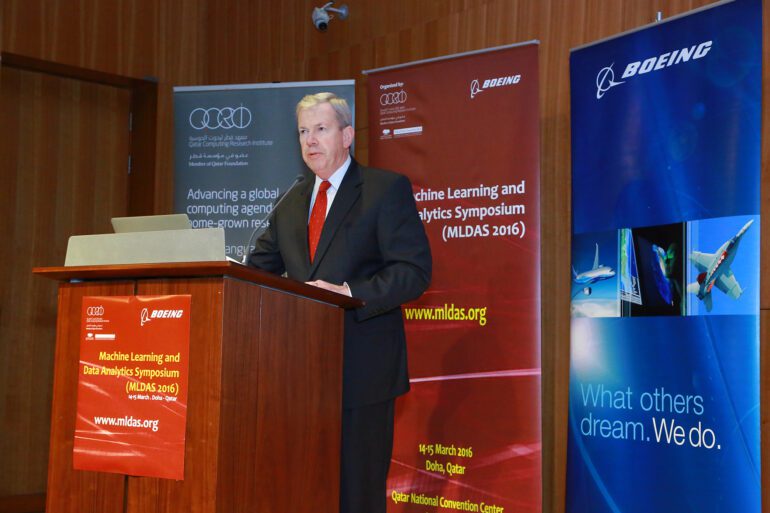TL;DR:
- QCRI and Boeing are extending their collaborative partnership beyond research into real-world aerospace applications.
- The focus is on developing robust AI solutions to enhance the safety, efficiency, and sustainability of aircraft operations.
- Boeing’s strategic integration of software decisions and professional growth initiatives for its employees is driving innovation.
- The “connected cargo” project aims to improve operational efficiency, starting with the Boeing 777-8 Freighter and Qatar Airways.
- A decade-long partnership has led to pioneering research in predictive maintenance, machine learning, and computer vision for aerospace systems.
- The collaboration is evolving to address complex challenges in autonomous systems and other cutting-edge domains.
Main AI News:
In a dynamic era of technological advancement, the Qatar Computing Research Institute (QCRI) at Hamad Bin Khalifa University (HBKU) and Boeing, the world’s foremost aerospace company, are poised to soar to new heights through an extended and evolving partnership. This longstanding collaboration, steeped in innovation and a commitment to nurturing local talent in Qatar, is now transcending the realm of research to materialize in real-world applications. The focal points of this venture encompass robustness, adaptability to unforeseen challenges, and the development of cutting-edge AI solutions, all aimed at ensuring the safety, efficiency, and sustainability of aircraft operations.
Pioneering Progress: From Research to Real-World Impact
Artificial Intelligence Chief Technologist and Senior Technical Fellow at Boeing, Dragos Margineantu, elucidates the essence of this transformative journey. “To label something robust means it handles unforeseen circumstances well. We face this challenge with machine learning and artificial intelligence systems,” notes Margineantu during an interview with The Peninsula on the sidelines of the Machine Learning and Data Analytics Symposium (MLDAS 2023), a recent event of significant import.
A Forward-Thinking Approach to Aerospace Advancements
Three years ago, Boeing amalgamated its software engineers into a single, cohesive organization with a twofold purpose: to leverage economies of scale and to integrate software decisions across the entire lifecycle of their programs. This strategic maneuver has not only bolstered research and development efforts but has also fostered the professional growth of Boeing’s talented workforce. Margineantu highlights one of the standout projects currently underway – the development of “connected cargo” solutions. This innovative endeavor is poised to enhance operational efficiency, with the groundbreaking Boeing 777-8 Freighter, set to take flight with Qatar Airways as the launch customer.
A Decade of Aerospace Innovation
The Boeing-QCRI partnership, forged in 2012, has been at the forefront of pioneering research in the fields of predictive maintenance, machine learning, and computer vision for autonomous systems. Their collaborative efforts have deepened the understanding of data correlations emanating from aerospace systems, thereby facilitating the early detection of small objects and contributing to safer landings.
Expanding Horizons: The Vision Ahead
Ahmed K. Elmagarmid, the Executive Director at QCRI, underscores the dynamic nature of their partnership. “We’re hoping to expand our partnership. It’s very important to be dynamic and adaptive, and the problems that we started working on 11-12 years ago have evolved,” he asserts. With an eye on the future, Elmagarmid emphasizes its commitment to tackling increasingly complex challenges in the realm of autonomous systems and other cutting-edge domains, where its deep pool of scientific talent shines brightest.
Bridging Academia and Industry: MLDAS 2023
MLDAS 2023, jointly organized by QCRI and Boeing, recently graced Doha, providing a platform to disseminate insights into the latest frontiers of artificial intelligence. This symposium transcended academic boundaries to address the practical needs of the industry, offering valuable perspectives on AI applications in aviation, education, sports analytics, recommendation systems, and the technical intricacies associated with edge computing. It’s evident that QCRI and Boeing’s commitment to innovation and collaboration continues to drive aerospace advancements into uncharted territory, ensuring a brighter, more sustainable future for the industry.
Conclusion:
This deepening partnership between QCRI and Boeing signifies a strategic shift from research to practical innovation in the aerospace industry. Their emphasis on robust AI solutions and efficiency enhancements, as well as the development of “connected cargo,” reflects a commitment to ensuring safety and sustainability in aircraft operations. With a rich history of pioneering research and a focus on addressing complex challenges, QCRI and Boeing are poised to make significant contributions to the evolving aerospace market. The recent MLDAS 2023 event underscores the vital role of AI in aviation and related industries, signaling an exciting future for innovation and collaboration in the sector.

